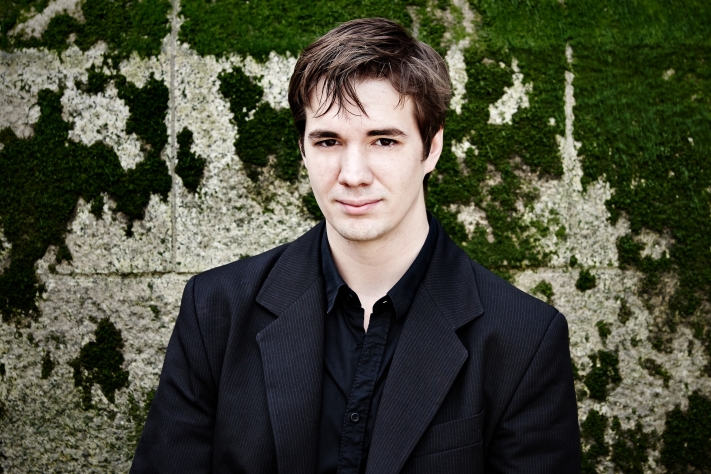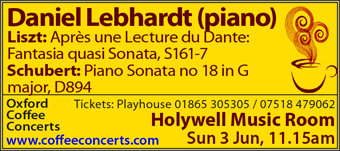Daniel Lebhardt returned to Oxford at the Holywell Music Room on Sunday morning, and those words are these days, for the piano aficianado, a guarantee of excitement. He likes to slip in a piece of Hungarian music, whether Franz Liszt or Bela Bartok, into his programmes, and here the former's Dante Sonata took a subsidiary role to Schubert's Piano Sonata no 18 in G major. The latter got off to a quiet, reflective start, not precisely melancholic since I detected an undercurrent of felicity in the music, certainly brought out by Lebhardt. A little dance-like figure succeeds it, before the drama of the central development section strikes home. The 'andante' follows a similar pattern, with a turbulent middle bookended between quieter elements. In the latter passages, the rests between notes become important. I was put in mind of a Pinter play – The Birthday Party, perhaps, or The Homecoming - where the pauses in dialogue chime as loudly as speech. The challenge for Lebhardt here was in managing the tempo as the music switched from major to minor key and back again, and that challenge was confidently met and faced down.
The 'menuetto' is nominally a dance, but I'd like to see the handsome couple from a Fanny Burney or Jane Austen novel who could stand up in comfort at a provincial musical rout to these rather virile notes that lack the bounce desirable for the dance floor. In the concluding 'allegretto', the first two notes, with their pronounced, detached slur, announce the expectation of staccatos and vigorous modulations to come. This sonata was Schubert in anti-virtuoso form, where the difficulties are interpretive rather than strictly technical.
Liszt's Dante Sonata is inspired by Dante's epic poem of the poet's journey through Inferno, Purgatorio and Paradiso, and the opening, discordant statement notes locate us squarely in the fiery kingdom. This is the sort of music to illustrate a medieval Dance of Death, a genre popular with moralising painters who liked to show a baronial hall or assembly room where revellers and dancers are abruptly interrupted by a skeletal figure, a henchman of Satan, whose acolytes filter through the space, picking out the damned and leading them off like lambs for the slaughter.
Lebhardt got straight down to the ebb and flow of the music, jagged at times and then chorale-like. Of course, the modern pianist plays with Liszt peering over the shoulder, the composer having been the greatest virtuoso of his day. There was an inexorable progression to the playing which built in pulses until the music seemed just to pour out of this young man like an Alpine torrent swollen in Spring by snowmelt. There was a contrasting quieter section, then the accelerator pedal was pressed once again. At the end, the applause was deafening, and we were rewarded with more Liszt; a 'forgotten' waltz, gently springy.
Another inspiring recital, and happily Daniel Lebhardt is expected to return in December as a duo with violinist Benjamin Baker.





